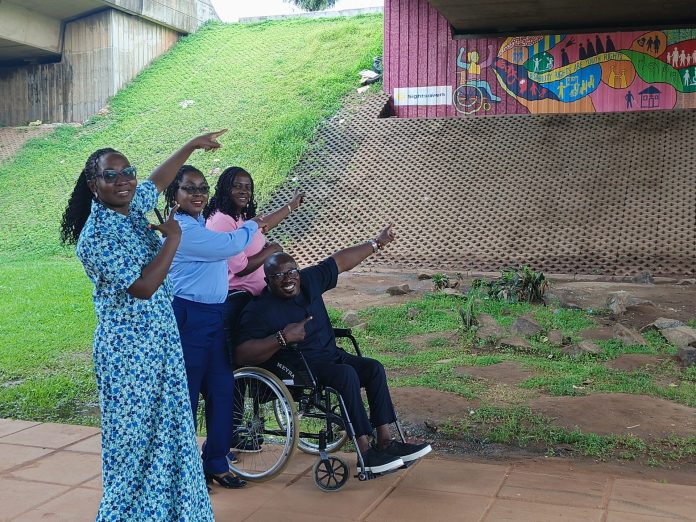In a fervent plea for better inclusion and equal opportunities, Persons with Disabilities (PWDs) have raised concerns over the persistent lack of access to essential infrastructure, education, health and others that favour their welfare. These obstacles, they argue, continue to diminish their standard of living and contribute to widening disparities in opportunities between them and the rest of society.
The PWDs aired these concerns during a significant event on Wednesday, held in Abuja, where SightSavers Nigeria unveiled a powerful mural at the Area One roundabout. The mural is set to represent the voices of Nigeria’s disability community ahead of the high-profile Summit of the Future, scheduled for the 79th United Nations General Assembly (UNGA) on September 22-23, 2024, at the UN Headquarters in New York.
The summit, themed “Leaving No One Behind: Acting Together for the Advancement of Peace, Sustainable Development, and Human Dignity for Present and Future Generations,” will serve as a platform for leaders worldwide to discuss progress on the Sustainable Development Goals (SDGs). For Nigeria’s disability community, this global event presents a vital opportunity to highlight their longstanding issues, push for change, and demand action.
A Struggle for Accessibility
Despite the Discrimination Against Persons with Disabilities (Prohibition) Act, which was signed into law by former President Muhammadu Buhari on January 23, 2019, many public and private institutions in Nigeria have failed to provide the necessary accessibility for PWDs. The act stipulates the modification of public buildings, structures, and transportation systems to ensure they are accessible to people with disabilities. However, over five years into the implementation period, progress has been slow.
The act also established a National Commission for Persons with Disabilities, tasked with ensuring that PWDs have access to fundamental rights such as housing, education, healthcare, and more. Yet, the lack of enforcement and adequate funding has left millions of PWDs still grappling with barriers in almost every aspect of their lives.
The Call for Policy Implementation
At the unveiling of the mural, Chris Agbo, Secretary-General of the Joint National Association of Persons with Disabilities (JONAPWD) FTC Chapter, stressed the need for stronger efforts toward the full implementation of the disability law. According to Agbo, the government must allocate sufficient budgetary resources to enforce the act and fully empower the National Commission for Persons with Disabilities.
“We are calling for the full implementation of the Discrimination Against Persons with Disabilities Act,” Agbo said. “Policies alone won’t change anything unless they are properly funded and followed through. We need to ensure that over 35 million PWDs in Nigeria can benefit from the protections this law promises.”
Agbo also emphasized the significance of the mural, commending SightSavers for their dedication to highlighting the plight of PWDs in Nigeria. “This mural shows a commitment to ensuring that PWDs have access to healthcare, education, and their voices are heard at decision-making forums,” he remarked.
A Push for Economic Empowerment
One of the main concerns raised during the event was the lack of economic opportunities for PWDs, particularly women and girls, who face double discrimination due to their gender and physical impairments. Benjamin Isaac, a member of JONAPWD, advocated for the inclusion of PWDs in critical decision-making processes, arguing that it would enable them to address their unique challenges more effectively.
“PWDs should be included in discussions about policies that affect their lives,” Isaac stated. “Only then can we make real progress toward providing them with the education and economic opportunities they need to thrive.”
Isaac noted that without economic empowerment, many PWDs, especially girls, will continue to be marginalized, leaving them unable to access education and other essential services. He urged policymakers to prioritize creating employment and entrepreneurship opportunities for PWDs to break the cycle of poverty that often accompanies disability.
Mural as a Symbol of Hope
The mural, designed to capture the struggles and aspirations of young persons with disabilities, will be showcased at the upcoming UNGA summit. Esther Bature, SightSavers Nigeria’s Country Advocacy Coordinator, explained that the artwork aims to draw global attention to the voices of young PWDs who are often overlooked in decision-making processes.
“We want the world to pay attention to the plight of young persons with disabilities,” Bature said. “They have so much to contribute to the nation’s growth if only they are given a seat at the table. This mural is our way of ensuring their voices are heard loud and clear at the Summit of the Future.”
Bature further highlighted the summit as an opportunity for world leaders to reflect on the progress made toward achieving the SDGs and to take action to ensure inclusivity for PWDs in areas such as education, healthcare, and economic empowerment.
“The SDGs are clear about leaving no one behind,” she added. “But we need to make sure that this commitment is translated into real action. Young PWDs deserve the chance to be part of critical conversations that concern their future, and this summit provides that platform.”
Looking Ahead: The Importance of Inclusive Development
As the Summit of the Future approaches, advocates like Bature hope that the event will lead to meaningful discussions and commitments to better integrate PWDs into Nigeria’s development plans. The call for inclusion is not just about laws and policies but also about creating a society where every person, regardless of their ability, can contribute to and benefit from the nation’s growth.
For Nigeria’s disability community, the mural is more than just a piece of art—it is a symbol of hope, resilience, and the ongoing struggle for recognition and equality. With global attention now focused on their plight, there is a renewed sense of optimism that change is not only possible but imminent.
As Chris Agbo aptly put it, “We’re not asking for special treatment—we’re asking for equal treatment. PWDs deserve access to the same opportunities as everyone else, and with the full implementation of the disability law, we can start to make that a reality.”


